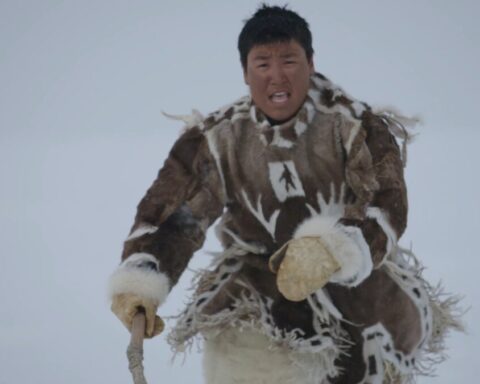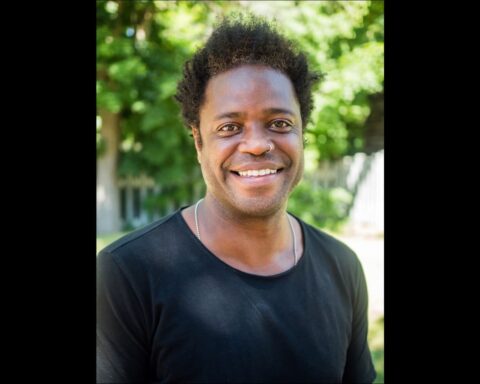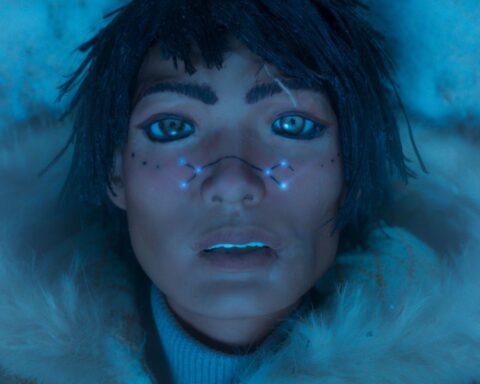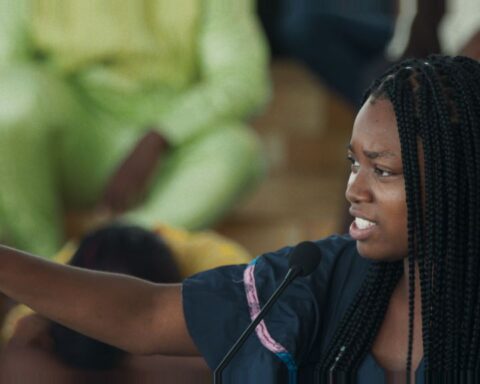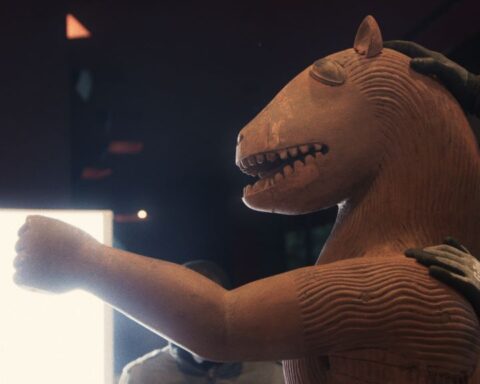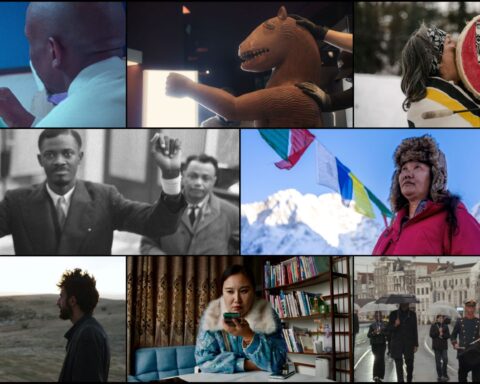Any cinephile would agree that film is a magical medium. It can transport viewers from reality to a virtual world in an instant. But films can also transform filmmakers.
“Remember me at Ryerson?” Julia Kwan asks me. “I was so scared; I was in a room full of extroverts everyday. It took me a while to adjust to that environment. But now, I feel ‘empowered.’ I finally feel like I have a voice.” She has mastered the art of projecting an out-going persona, absolutely necessary if you’re going to work as a director. “I’m so not that type of personality and it has taken me so long!”
Julia is, like me, an Asian woman. In our days studying film in downtown Toronto at Ryerson, she would never raise her voice even in extreme situations. Today, she leads her cast and crew towards her vision with complete confidence. It is the process of filmmaking that has brought on the magical transformation in this writer-director. The joy she has found in writing throughout the years has opened her up, lifting smothering childhood baggage and gently liberating the visual story-teller in her.
Julia Kwan’s debut feature Eve and the Fire Horse, a winner at the Sundance, Calgary and Vancouver Film Festivals, is full of magic. It is a story of a distressing childhood and of spirituality. Horses have a special meaning for the main character, Eve’s, life. She was born a Fire Horse as was Julia. The Fire Horse is a Chinese astrological sign that only occurs once every sixty years. It brings tragedy to the child and the whole family. Superstitious parents often chose to drown their own children in the village river to escape such a fate. Fire Horses, like Eve, are strong- willed, or they would not be able to withstand all the bad luck and blows that fate has prepared for them. From the recurring hospitalizations of her loved ones, to the guilt she bears from her grandmother’s death, Eve is bombarded with the trials of a Fire Horse from a young age. Her misguided interpretation of faith fuels her imagination and ultimately fulfills a deadly curse. Given the circumstances, Eve goes through without adequate parental guidance, viewers might anticipate her spiritual journey, which includes an embrace of Catholicism combined with Buddhism, would spiral downwards. Can Eve achieve redemption through her spirituality? Religious audiences might find some scenes disturbing, but that is exactly Julia’s point.
“I’m very much like Eve in the film. I had a wild imagination,” Julia says. “When I wrote this film, what I really wanted to explore was the way a child deals with big issues in life, like guilt, death and religion. How does young Eve process the guilt of being responsible for her grandmother’s death? At the same time Eve was introduced to this whole new idea, Catholicism, and was trying to understand those heavy issues as well. I really wanted to explore these elements through a child’s eyes.”
Julia is no new-comer to exploring the world through children. Her award winning short Three Sisters on Moon Lake (2001), also dealt with children processing information in an absurd way, far different from adults. Julia believes that adults should be discreet in the way they convey messages to children, as their shallow logical reasoning could very easily overwhelm their immature view of life. Disaster could happen, as in the film.
“As a child, all your senses are heightened, your emotions are heightened,” Julia recalls. “I was interested in exploring that because you’re going through all these new experiences and those memories resonates more in my mind. I think that’s why I’m interested in childhood, yet, it is definitely not my favourite period in life!”
Being raised as an Asian girl in Vancouver in the ’70s, Julia Kwan’s upbringing resembled that of most Chinese-Canadian families at the time. “We were taught at a very young age not to really express ourselves but just smile and be polite,” Julia remembers. We see this trait consistently reflected in the film through Eve and her sister, Karina. “But I was such a cliché, such a good girl—I was like in the front row with my hands clasped together, and really good posture. It was so ingrained as a child. That was very much a part of my childhood, my upbringing,” says Julia. “I remember sometimes spending a day in elementary school and not saying a word to anybody; I think that plays out in your adulthood as well. Definitely I’m more out-spoken now, (though) sometimes I still have those childhood remembrances. During interviews, for example, I’m not very comfortable speaking, articulating my views. I still have it ingrained that I really don’t have a lot to say that’s of value.”
Being such a shy child with a rich imagination, Julia started writing a journal when she was quite young. For her, it was a completely liberating experience. She was able to express herself through written words, where she was less able to express her thoughts through speaking. This catharsis nurtured her expressive imagination, and she became interested in being a writer.
“I went into film school because I had aspirations to be a screenwriter,” explains Julia. “Yet along the way I realized that the person who has more control is the director. I didn’t really want other people to be touching my words, and the vision that I had. That’s when I became interested in directing as well because I’m quite a visual writer and I have a very strong idea as to how these images should look on screen.” Julia admires the look of Lynne Ramsay’s Ratcatcher. “It’s so visually striking and emotionally resonant. I was really influenced by that kind of lyrical realism. I loved that style and I watched a lot of Truffaut. I watched The Four Hundred Blows and Small Change. I think it really captured the essence of childhood. And visually, I watched Wong Kar-Wai’s In the Mood For Love: what striking colours, framing and composition. And the music I love.”
In all her screenplays, Julia unfolds her story through images. When words are called for, her lyrical lines also run visually. For example, when Eve witnesses her mother’s miscarriage, she bursts out, “My brother was all liquid, when he showed up in this world.” The juxtaposition of such images and words resonates with an audience. At times, Julia balances bitter issues with a humorous undertone, like the imagery of a fantasy encounter between Jesus and Buddha, who are not necessarily at odds with each other as seen in real-life religious politics.
In a big metropolitan city like Vancouver where Julia was raised, a lot of Canadians grow up in a mixed ethnic neighbourhood and are taught at an early age how to get along, or even appreciate other cultures. In other parts of the world where racial tension is high, children at a very young age are exposed to military brainwashing, taught to hate and be unforgiving. Julia’s exploration of how Canadians of multi-faith and ethnicity have been able to live together in harmony is very timely in this post-9/11 era of suicide bombings and terrorism.
Julia recalls a tough childhood incident involving ethnic stereotypes, which she recreated in Eve and the Fire Horse. “There was a Sikh boy in our neighbourhood and the other Asian and white boys would actually try to knock the turban off his head. Then one day, he tried to throw snowballs at me. It really hurt because you think that you were fighting the same battle. But he was a child and he didn’t know to deal with it. Experiencing that sort of racism either makes you empathetic or angry. That was the way he needed to express his pain. I wanted to explore how hatred breeds hatred in a child through the character of Surinder in the film.”
Being a first generation immigrant child is hard. The whole world outside is so different from your own ethnic family traditions, and you have to fit in to both. Most immigrant parents want to have a traditional daughter, who will get married and give them grandchildren. “There’s a lot of pressure,” admits Julia. “I know without question that my parents love me, so I do feel a sense of guilt. Career-wise, success for them equates to a big paycheque. That’s how they judge it, and in their eyes, I’m not. But lately they are getting somewhat excited. Shooting Eve and the Fire Horse, I was getting a bit of press coverage in the Canadian Chinese newspaper. They actually cut out the newspaper clippings and were showing them to their friends.” Being recognized by her family has clearly helped Julia’s self-image.
With Chinese media coverage attained, a child of immigrants can assure their parents that venturing into arts as a career is an honourable choice. “Growing up, my only role model, media-wise, was Nancy Kwan, which is ironic; my sister’s name is Nancy Kwan. Oh, films like _The Flower Drum Song!_” Julia smiles. “Looking back, she wasn’t really a good role model for Asian girls. She was always the pretty, submissive one. But I would really love to cast Nancy Kwan in a movie one day. She’s so much a part of my childhood.”
Unlike Nancy Kwan, the characters that Vivian Wu played in the past were independent, strong-willed and singular- minded, much like a Fire Horse. That prompted Eve’s producer, Shan Tam, to picture her as the working class immigrant mother. “I was only thinking about Sylvia Chang and Joan Chen at first. So I watched The Soong Sisters and I thought Vivian was perfect for the part. We contacted her and it turned out oddly enough, that she herself was a Fire Horse. Vivian was so easy to work with. We really had this connection from the very beginning. With everybody else, it was work, but with her, directing was done very minimally. Sometimes when she did a scene, it was exactly like I had imagined this character would say the line. She was completely professional and cared about the project. I was lucky to have her on board.”
From Inflamed (1993), her fourth-year student film which received the award for best experimental film at the Canadian Student Film Festival in Montreal to Eve and the Fire Horse, Julia Kwan has been consistent in theme and style. Her works are moody, lyrical, and soft-spoken, but with a message loud and clear, like a “soft-spoken scream…My stories are part- truth and part-imagination. My style is to play with ideas that are very personal to me, not exactly autobiographical but emotionally resonant.” The family dynamics in Eve ring true; she avoids stereotypes, like the unwaveringly strict Chinese father-figure. Eve’s family might be dysfunctional, but all the members are trying hard to love each other in their own way. While the dialogue might seem too lyrical for the working class immigrant parents, consistency in style and mood hold the film together.
“A major theme in all my work is probably spirituality,” observes Julia, “and my spiritually is still evolving. I was always questioning, trying to understand, like Eve, who gets really upset because the horses drowned when the Red Sea came together in the film The Ten Commandments. It wasn’t just the soldiers…Children have such a strong sense of right and wrong, and she couldn’t understand why God would drown all the horses. That’s very much part of the state of mind that I wanted to explore.”
Today, Julia is still soft-spoken, but no longer shy. The magic of filmmaking and family acceptance unearthed hidden qualities in her. She now has the confidence to express her views as well as the imagination to do it in style. Her world has expanded, both professionally and personally. “I’m not limiting myself only to personal films. I like to do films that challenge me. When I’m more established, I would love to start some sort of filmmaking program for high school students, especially for girls who can’t afford it. I never in a million years thought that I would ever be a film director. That wasn’t within my realm of possibilities as a child. I want kids nowadays, especially girls, to feel like it might be a possibility.”
A Fire Horse is supposed to bring bad luck and tough living. That superstition has been broken in Eve and the Fire Horse, as well as in real life. There is an old Chinese saying, “If you have a persevering heart, you can grind a metal pillar into a needle.” Julia Kwan may not look like the typical authoritative film director, but there’s no doubt now about her inner strength. She has what it takes to grind that pillar into a needle, and her needle shines in the eyes of her audience.




